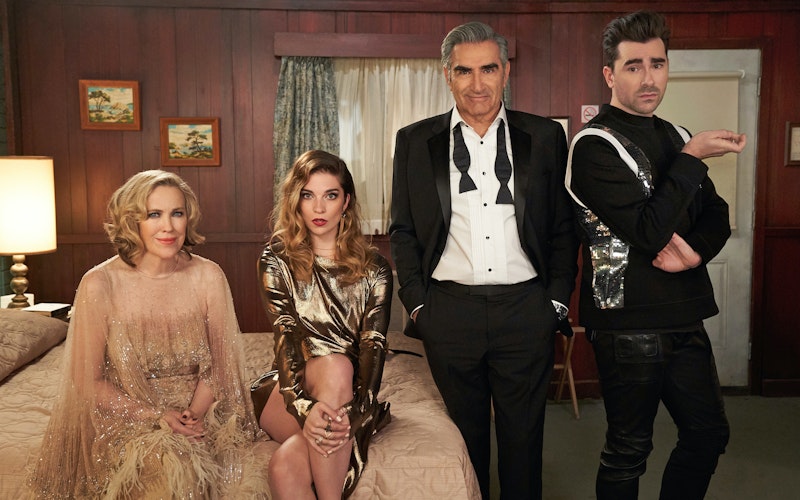
TV
Born Again in Schitt’s Creek
For the once-wealthy Rose family, moving to the backwater burg of Schitt’s Creek was something of a come-to-Jesus moment.
For six seasons now—including the current, final one—we’ve watched the Roses try to recover after losing their fortune in the video-rental business. The town of Schitt’s Creek—which they once purchased as an elitist joke—is the only thing they have left. And so dazed father Johnny (Eugene Levy), drama-queen mother Moira (Catherine O’Hara), persnickety son David (Daniel Levy, Eugene’s actual son and co-creator of the series), and spoiled daughter Alexis (Annie Murphy) move into adjoining rooms in the town’s dumpy motel. Humbled by their circumstances, required to live in close familial quarters, and forced to associate with the uncouth locals (including Chris Elliott as the proudly hillbilly-ish mayor), the Roses gradually, hesitantly find their place in the last place they would expect.
This is a slow process; much of the comedy in the first few seasons comes from the gasping the Roses do as fish out of premium, distilled water. Yet as genuine friendships develop—with Stevie (Emily Hampshire), the motel manager, and even Elliott’s mayor—the Roses begin to turn a corner.
A key moment comes in “Friends & Family,” an episode from Season 3, when the Roses receive the gigantic family portrait that used to hang in their mansion. “You don’t look very happy in this,” Stevie observes. Johnny and Moira have trouble finding a place for it in their tiny motel room, prompting David to ask, with a characteristic blink and snap of his head, “Did it grow?” Actually, what’s happened is that the Roses’ perception of themselves has shrunk, as their eyes have been opened to a world beyond themselves. When they decide to put the portrait outside with the rest of the motel’s trash, you might even say they’ve been born again.
TC Podcast: Born Again (Schitt’s Creek, Sufjan Stevens’ The Ascension)
That might seem like a stretch, given the contemporary associations attached to that biblical phrase. Today, being “born again” suggests a startling personal epiphany leading to a new and holy life. But when Jesus told Nicodemus that “no one can see the kingdom of God unless they are born again,” is that what he meant?
The Today devotional, a partner program with Think Christian, has considered the Nicodemus story twice this year. In March, Rebecca Jordan Heys described being born again in a way that also captures the Roses’ experience: as “a fresh start.” More recently, A.J. Gretz wrote about being born again as a continual process, something that can be traced over the course of a lifetime (or a television series). “Today we might associate the idea of being ‘born again’ with a dramatic conversion story,” Getz wrote. “But rebirth in Christ is not a one-time event; discipleship involves a continuous dying and rising with Christ. As we grow in faith, Jesus cleanses us from sin and reshapes us in his own image. Again and again, we must allow him to reshape our priorities, change our attitudes, and empower us for service.”
And so, as Schitt’s Creek concludes, it registers less as the perfection of the Roses than a collection of messy, born-again moments, as the Roses repeatedly (and invariably reluctantly) die to themselves and rise to something better. I think of Johnny’s problematic confession in “Motel Review,” also from Season 3, after he is caught writing Alexis’ economics paper for her. When she asks why he never did that when she was younger, he offers, “Because I wasn’t around back then to help you cheat, and I regret it.” Alexis has her own awakening in “Maid of Honour,” from the final season, where she willingly cedes the spotlight to Stevie while making David’s wedding plans. Surprising herself, she asks David, “What’s happening to me?” He responds, “You’re going soft.” For his part, David’s growth can be traced in Levy’s comically expressive face, as that trademark, open-mouthed look of appalled disbelief gives way to pursed lips of appreciation, as he tries to hide a genuine smile.
Speaking with the befuddled Nicodemus about being born again, Jesus also offered this: “Very truly I tell you, no one can enter the kingdom of God unless they are born of water and the Spirit.” This baptismal reference made me think of “Smoke Signals,” the Season 6 premiere, in which Johnny and Moira impulsively decide to go skinny-dipping. When Moira wanders off to take a phone call from her agent, she leaves Johnny to nearly be arrested for indecent exposure. (If Moira is the least changed by the Roses’ circumstances over the course of the series—clinging to the hope that a bit part in a schlocky horror sequel, The Crowening, will return her to prominence—that may also be why she strikes me as the funniest character.)
Johnny emerges from the woods at the end of the scene, dripping wet and accompanied by an off-duty police officer who is carrying fishing equipment. The officer only gives a warning, admitting that he shouldn’t have been fishing in that spot anyway. In one sense the scene is a botched baptism, a moment marked by a pair of transgressions. But in the grand scheme of Schitt’s Creek, which has offered six seasons of slow spiritual renewal, it can also be seen as an instance of Johnny being born again, yet again.
Topics: TV